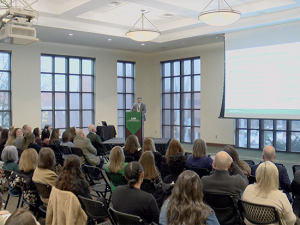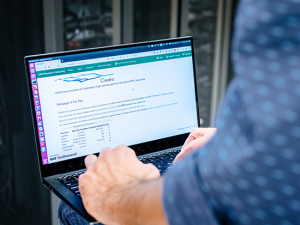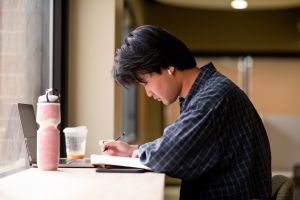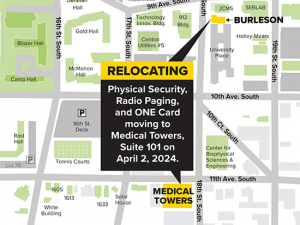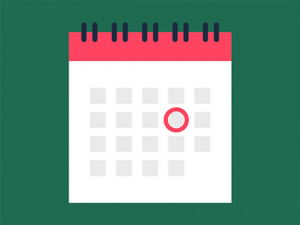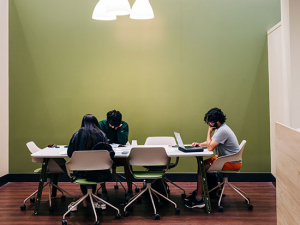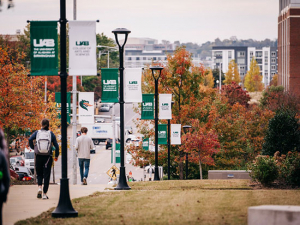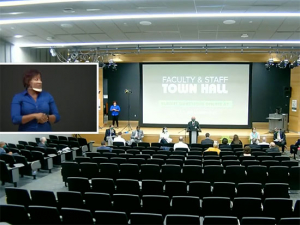 Studying for exams can be overwhelming. But what if it wasn't? Photo by Jennifer Alsabrook-Turner | UAB Marketing and Communications
Studying for exams can be overwhelming. But what if it wasn't? Photo by Jennifer Alsabrook-Turner | UAB Marketing and CommunicationsExam week can be a high-stress time on campus. As the semester comes to a close, classes get harder and assignments become more complex. It can be tempting to let homework pile up as you prioritize fun activities, thinking you have plenty of time to study later.
Kristen Chapleau, executive director of UAB’s Vulcan Materials Academic Success Center (VMASC), and Telisha Hollamon, M.A. Ed., assistant director of academic support at VMASC, are familiar with the “cram for the exam” approach. However, they encourage students to avoid the cram by preparing themselves, setting realistic schedules, and utilizing a few tried-and-true methods to get the results they intend.
VMASC, located in Sterne Library, Room 222, is a student-centered, peer-led tutoring and small group instruction center designed to meet the needs of students as they work toward their degrees. “Our tutors and supplemental instruction leaders have taken the courses at UAB and pride themselves on providing support to their peers. Our peer educators are excellent in their content and have a passion for helping others,” said Hollamon.
We asked Chapleau and Hollamon to share some of VMASC’s best tips for exam prep. Hint: They don’t recommend students stay up all night or schedule marathon study sessions at the library for days on end.
Q: What are healthy habits students can employ all semester to prepare themselves?
A: "The best practices for student success start with a proactive approach," said Hollamon. "Create a time management plan that reflects all courses, study time, brain breaks, personal time, and entertainment. Next, create a checklist, and prioritize items by most urgent. Check the items off when you accomplish them and create a reward system to celebrate yourself. Treat yourself after completing a major goal. Rewarding yourself will further develop your sense of self-efficacy, increasing the chances that you will complete the other tasks. Creating a time management plan is the first step to student success," she said.
"Studying all day is not the solution. Instead, study in 30- to 40-minute increments with breaks in between. Remember, the brain learns best in chunks," said Telisha Hollamon, VMASC assistant director of academic support.
A: "Assess your ability to recall," said Hollamon. "Do this by creating study cards and saying the responses out loud. I recommend that study cards move beyond definitions and include specific examples. This will exercise your working memory and your ability to recall at the same time."
Q: How can students manage having to prepare for different types of exams (multiple choice, essays, or combo) for different classes?
A: "Different types of tests require different test-taking approaches. For multiple choice tests, read each question carefully, compose an answer in your mind before reading answer choices, then read each choice and choose the one that fits most closely with your precomposed answer. During true-false statement tests, remember every word must be true for the answer to be true. For both multiple-choice and true-false, always pay close attention to absolutes such as never or always. With essays, create an outline that depicts a claim statement that answers the prompt. Creating a claim statement further helps organize the essay and sets the tone for writing. Most importantly, answer the prompt in its entirety," said Hollamon.
Q: What is a realistic break schedule that helps make studying feel less overwhelming?
A: "A realistic break schedule starts the first week of class! Each class should have a set study time, and the study time should not be all in one day," said Hollamon. "After each class, be sure to update and review your notes, which may take anywhere from 15 to 30 minutes. Studying all day is not the solution. Instead, study in 30- to 40-minute increments with breaks in between. Remember, the brain learns best in chunks."
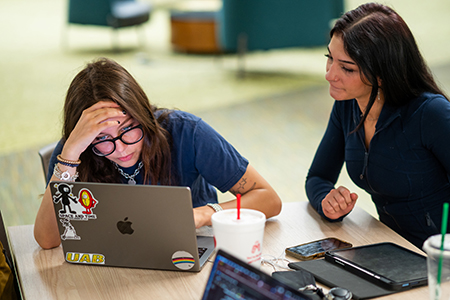 It’s normal to feel a moderate amount of stress, and it’s a good thing to want to do well. Make a plan, and stick to it. Photo by Jennifer Alsabrook-Turner | UAB Marketing and Communications
It’s normal to feel a moderate amount of stress, and it’s a good thing to want to do well. Make a plan, and stick to it. Photo by Jennifer Alsabrook-Turner | UAB Marketing and CommunicationsQ: How can students manage stress during high-stakes times like exam week?
A: "Have a plan," said Chapleau. "When you feel overwhelmed, participate in some form of physical activity such as running or stretching to induce calm and lower cortisol levels. Worrying about feeling anxious may lead to poor results. When feeling overwhelmed, use breathing techniques with imagery. On the other hand, it’s normal to feel a moderate amount of stress, and it’s a good thing to want to do well. Use a calendar to schedule time not only for studying but also for breaks. Seeing a plan visually can help you feel more in control. Another vital part of stress management is a healthy sleep schedule. Sleep is crucial for memory and concentration, so aim for at least 7 to 8 hours of rest," she said.
Q: What about managing stress during the exam itself?
A: "Get a good night’s sleep and use positive self-talk, affirmations or self-reminders like 'I have prepared for this,' 'I can stay calm,' or 'I am capable' to redirect anxious thoughts into productive focus," said Chapleau. "Also, practice grounding techniques. If you feel panicked during an exam, a quick grounding exercise, like the 5-4-3-2-1 technique, can help. Here’s what that is: Mentally name five things you can see, four things you can touch, three things you can hear, two things you can smell, and one thing you can taste. This brings your focus back to the present moment and away from racing thoughts. Be sure to take deep breaths if you feel your mind start racing so you can help yourself recenter. And remember, preparation equals confidence. The more you know about the exam structure and content, the better."
Q: Can you suggest any mindfulness techniques that help with overwhelm?
A: "Set a timer for a 5- to 10-minute break every hour to stretch, walk, or sit quietly. Use this time to just focus on your breath or observe the surroundings," said Chapleau. "Scrolling social media is fine, but make sure you hop off when the timer goes off. This habit can help reset focus and avoid burnout from long study sessions. Students can also utilize TAO, a free app available to UAB students that has tools and educational materials to help you learn about and change how you think and feel. Progressive muscle relaxation is another technique that involves tensing and then releasing muscles from head to toe, which can help students release physical tension and focus on relaxation. Taking a mindful walk around campus, or even in the library, can also be a great way to reset."
Q: Tell us about UAB reading days. How can students make the most of them?
A: "During reading days students should set a purpose for reading and studying. Annotating and marking the text is a strategy that requires the reader to engage with text by asking questions, summarizing, and making connections with the text," said Hollamon. "After reading, write a summary of the reading based on the title or create another product to illustrate the concept of the reading. Other products could include a graphic organizer, a table, a chart, or an illustration. Maximizing reading time will improve comprehension. You may find that short answer, essay questions, or even class discussions become easier."
Q: What UAB resources can help students with exam prep and beyond?
A: "VMASC offers tutoring, supplemental instruction (SI), success coaching and study skill workshops. Connecting with a tutor or attending SI sessions can give students confidence and clarity on complex material," said Hollamon.
"Also, UAB’s Counseling and Wellness Center provides stress management workshops, mindfulness workshops, individual counseling, and group therapy sessions. It’s a safe place to talk through stressors, and it’s free to students. In Mervyn Sterne Library, be sure to take advantage of both study space and resources located there. Reserve a quiet study room, or head to the third floor to center your focus. If you need help with research or can’t find what you need, ask a librarian at the help desk on the first floor. Also located on the first floor is the University Writing Center. They can help with brainstorming ideas for essay questions on an exam, ideas for an upcoming paper, or editing your lab report. Be sure to make an appointment or check their walk-in hours. And don’t forget academic advisors. They are a wealth of knowledge and are there to help you succeed."
Q: Any final thoughts?
A: "I recommend students make an appointment with one of VMASC’s success coaches to create an individualized plan," said Hollamon. "In addition, we also offer strategies for how to approach reading, note-taking, studying, and test-taking skills. Meeting with a success coach further equips students with the resources to achieve their academic goals. Students that have a pattern of being organized and planning their time perform better academically than others."

